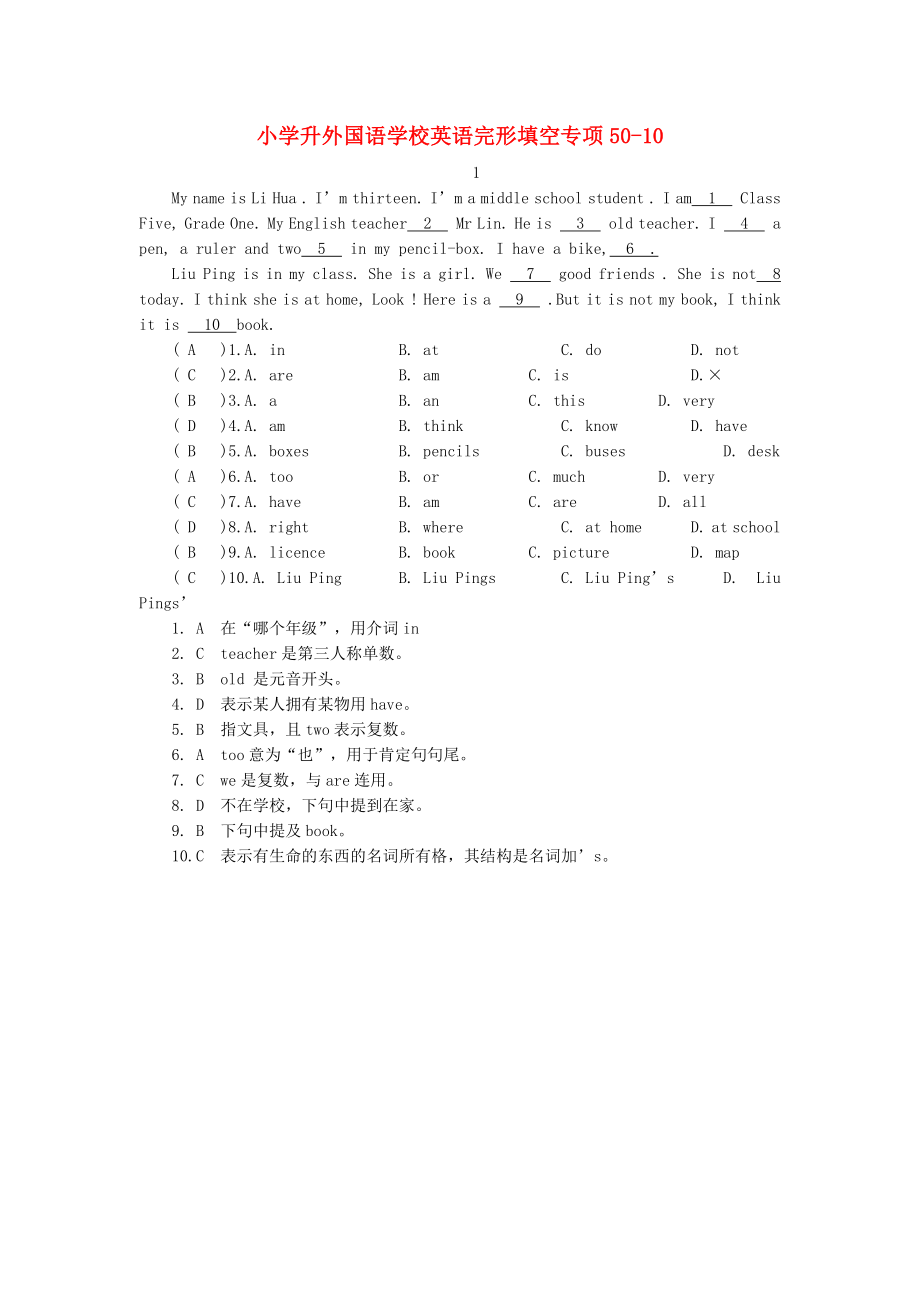《寧夏外國(guó)語(yǔ)學(xué)校小升初英語(yǔ)專項(xiàng)訓(xùn)練 完形填空10》由會(huì)員分享��,可在線閱讀�,更多相關(guān)《寧夏外國(guó)語(yǔ)學(xué)校小升初英語(yǔ)專項(xiàng)訓(xùn)練 完形填空10(2頁(yè)珍藏版)》請(qǐng)?jiān)谘b配圖網(wǎng)上搜索。
1�、小學(xué)升外國(guó)語(yǔ)學(xué)校英語(yǔ)完形填空專項(xiàng)50-10
1
My name is Li Hua . I’m thirteen. I’m a middle school student . I am 1 Class Five, Grade One. My English teacher 2 Mr Lin. He is 3 old teacher. I 4 a pen, a ruler and two 5 in my pencil-box. I have a bike, 6 .
Liu Ping is in my class. She is a girl. We
2、 7 good friends . She is not 8 today. I think she is at home, Look ! Here is a 9 .But it is not my book, I think it is 10 book.
( A )1.A. in B. at C. do D. not
( C )2.A. are B. am C. is D.×
( B )3.A. a B. an C. this D. very
( D )4.A. am B. think C
3�、. know D. have
( B )5.A. boxes B. pencils C. buses D. desk
( A )6.A. too B. or C. much D. very
( C )7.A. have B. am C. are D. all
( D )8.A. right B. where C. at home D. at school
( B )9.A. licence B. book C. picture D. map
( C )10.A. Liu Ping B. Liu
4、 Pings C. Liu Ping’s D. Liu Pings’
1. A 在“哪個(gè)年級(jí)”�,用介詞in
2. C teacher是第三人稱單數(shù)。
3. B old 是元音開(kāi)頭��。
4. D 表示某人擁有某物用have�����。
5. B 指文具�,且two表示復(fù)數(shù)。
6. A too意為“也”�����,用于肯定句句尾��。
7. C we是復(fù)數(shù)�,與are連用。
8. D 不在學(xué)校���,下句中提到在家���。
9. B 下句中提及book。
10.C 表示有生命的東西的名詞所有格���,其結(jié)構(gòu)是名詞加’s�����。
2
Hello, g
5����、irls and boys! My name is David. I’m from Canada. I’m in the U.S.A. now. I like 1
here. So I often eat a lot 2 food. I have breakfast at home. 3 breakfast, I eat eggs and apples. I 4 milk at all. I have no time (沒(méi)時(shí)間) to go home for lunch. The lunch 5 is good. I can have 6 foods
6、 for lunch. I eat chicken, tomatoes(西紅柿) and oranges. Sometimes(有時(shí)) I eat salad(色拉) and hamburgers. I have dinner at home 7 my father and mother. Sometimes we 8 with our friends. We 9 fish, vegetables and fruits (水果). What 10 you? Please tell me.
( A )1. A. the food B. the drink C
7�����、. the people (人,人們) D. the students
( B )2. A. for B. of C. from D. /
( D )3. A. As B. Have C. On D. For
( C )4. A. like B. not like C. don’t like D. likes
( B )5. A. at home B. in our school C. in the home D. in school
( C )6. A. the same B. same C. different
8����、D. the different
( D )7. A. to B. and C. for D. with
( B )8. A. eating B. eat out C. have D. having
( A )9. A. have B. to eat C. having D. eating
( D )10. A. are B. for C. can D. about
1. A 從后文談?wù)摰脑掝}可以判斷出此處是食品,故選A����。
2. B a lot of是個(gè)固定短語(yǔ), 意思是“許多”, 后面可加不可數(shù)名詞或可數(shù)名詞
9、的復(fù)數(shù)��。
3. D eat ... for ... 表示“某頓飯吃什么”, 這里將for breakfast提到了前面�����。
4. C not ... at all意為“一點(diǎn)也不”��。句意為“我根本/一點(diǎn)也不喜歡喝牛奶”����。
5. B 通過(guò)上句“沒(méi)時(shí)間回家吃午飯”可以判斷出是在學(xué)校吃午飯, D短語(yǔ)不正確, 故選B���。
6. C 通過(guò)后文可以看出, 他午飯吃的種類很多, 而且different前面不用the, 故選C�����。
7. D have ... with sb.表示“同某人一起吃……”, 本句的意思為“我和父母一起在家吃晚飯”�。
8. B eat out表示“外出吃飯”。
9. A 本處是此句的謂語(yǔ)動(dòng)詞, 要用動(dòng)詞原形�。
10. D What about ... ? 表示“……怎么樣?”。
 寧夏外國(guó)語(yǔ)學(xué)校小升初英語(yǔ)專項(xiàng)訓(xùn)練 完形填空10
寧夏外國(guó)語(yǔ)學(xué)校小升初英語(yǔ)專項(xiàng)訓(xùn)練 完形填空10

